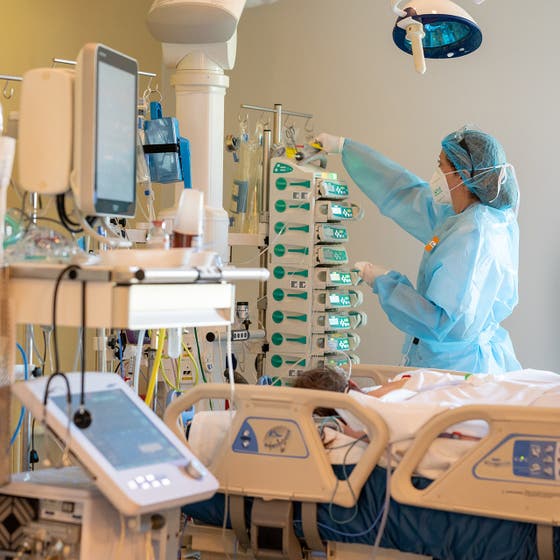Aug 5: High doses of blood thinners are effective for hospitalized COVID-19 patients, but not for ICU patients

Treatment with higher doses of blood thinners is effective in patients with COVID-19 who are hospitalized on the ward. Treatment can prevent these patients from becoming seriously ill and can improve the patients' recovery. However, treatment with such a dose of blood thinners is not effective for patients in the ICU. This is shown by research from three clinical studies worldwide (REMAP-CAP, ACTIV-4a and ATTACC), the results of which were published on August 4, 2021 in the prestigious New England Journal of Medicine.
UMC Utrecht intensivist and researcher Lennie Derde: “Since the start of the pandemic, doctors around the world have seen more blood clots in patients with COVID-19. Now we know better which treatment we can apply for this for ward patients as well as ICU patients. These research results have direct implications for the care of COVID-19 patients around the world.”

Dr. Lennie Derde
The researchers found in January of this year that treatment with high-dose blood thinners can prevent patients admitted to the ward from becoming seriously ill and improve their recovery. A month earlier, the researchers concluded that the anticoagulants in this high dose showed no improvement in patients in the intensive care unit. Because of the clinical implications for patients, the interim findings were released in advance at that time. Now the full results are available and published in the New England Journal of Medicine.
International cooperation
The three international consortia have been working together since May 2020, with the REMAP-CAP trial running in more than 300 hospitals across five continents. Lennie Derde coordinates the REMAP-CAP study in Europe and has recently become the chair of the international umbrella committee that oversees the study worldwide. The collaboration with the two other consortia from Canada and the United States is unique. Third: "The way how these different studies have joined forces is fantastic. This collaboration can serve as an example for other collaborations between large international clinical trials."
Funding
REMAP-CAP received funding from the European 7th Framework Programme under grant agreement No [602525] and from the European Union’s Horizon 2020 research and innovation programme under grant agreement No [101003589]. In Canada, the trials were supported by multiple international funding organizations including Canadian Institutes of Health Research (CAN), the LifeArc, the Provinces of Ontario and Manitoba, the Peter Munk Cardiac Centre, the Thistledown Foundation, CancerCare Manitoba Foundation, and the Victoria General Hospital Foundation; trial management and data coordination was provided by Ozmosis Research and Socar Research. Internationally, the trials were supported by the NIH National Heart, Lung & Blood Institute, Translational Breast Cancer Research Consortium and the UPMC Learning While Doing Program (US), National Institute for Health Research (UK), National Health and Medical Research Council (AUS), Health Research Council of New Zealand, and the PREPARE and RECOVER consortia (EU).
Publications
The ATTACC, SACTIV-4a, and REMAP-CAP Investigators. Therapeutic anticoagulation with heparin in noncritically ill patients with Covid-19. New England Journal of Medicine, published August 4, 2021
The REMAP-CAP, ACTIV-4a, and ATTACC Investigators. Therapeutic anticoagulation with heparin in critically ill patients with covid-19. New England Journal of Medicine, published August 4, 2021
